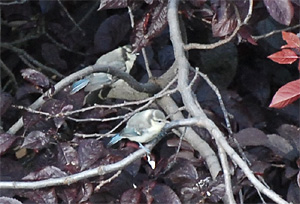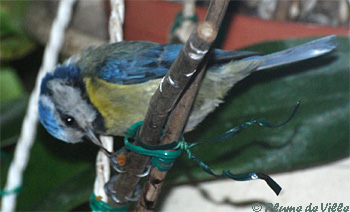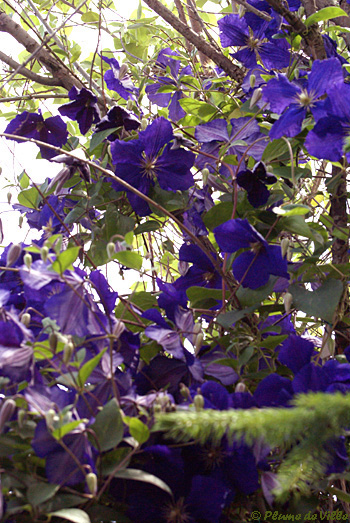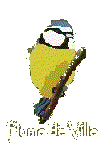Plume de Ville
From day to day.
°°°°°°°°°°°°°°°°°°°°°°° °
June 1st

Always
in
their purple tree (Purple hazel).
The sun
has attracted gatherers.
2 June
Showers. 18°C
Loyal
to
their tree.
They
await their mother.
3 June
Clouds and sunny
spells. 18 °C.
Not easy to
savour cherries for a wood pigeon. The branch bends under its weight
and the cherry
gets away.
A cherry tree in the garden attracts wood pigeons, they are more than a
dozen
to gather cherries in this way.
[Supplement
to taking flights of 26 May:
Here is a feeding from mother at the door, leaving Number 5 joined by Number 6. You can see their brothers and sisters waiting in the birch. The loading is a bit long. Please wait a few seconds.
]
4 June
Cloudy with sunny spells. 14°-20°C
Return
of
three youngsters. The rest of the band is still in the garden.
They are able to hold their prey with their claws and don't gulp the
mealworms
whole.
5 June
Cloudy
and not
too hot in the morning, 13-20°C.
They are
four this morning.
They
follow their mother in her travels.
They hold well the branches, even the thin ones, as this clematis stalk.
A
bath on
the way.
The
bill has
refined. He became the slim and pointed beak of insectivores.
Yellow
has almost completely disappeared.
Only
a small souvenir remains at the beak commissure.
The
cap is grey.
The wings
and tail continue to take bluish tones matched to the legs. You must
see them at
the proper angle, otherwise they seem uniformly grey.
They retain
a general grey tone beside their mother. They are very difficult to
locate,
their hue hides well them in the trees.
In
comparison, baby great tit gives a darker impression, even if it is in
the same
shades of camouflage.
The cap is black. The black band on the chest is clearly visible.
Souvenir,
souvenir...
One of the juveniles came back two seconds at the door of the nest box.
I left the plants resume their freedom. Then, difficult to see.
6 June
Weather
fresh and overcast.
Four
little
accompany their mother.
The others? I don't know yet, unclear if they are still in the garden.
We will
see in a few days.
Yesterday
evening, a jay landed on the birch and frightened the little (and me
for them!). It was beautiful. I've rarely seen them so close. It is
really a
big bird.
The young are starting to peck anything they find. Yesterday, one of them was long interested in a clematis bud which he pecked heartily.
The flower
bloomed today.
7-9 June
It is nice
and warm, 27°C.
Yet a short
visit to the nest box.
Two weeks
after their exit, they are four who pursue their mother, who leads them
farer
and longer. She is beset by her young, and often she fled pursued by
the entire
band in single file.
At the
beginning they waited calmly their turn, now they rush to the prey
almost
aggressively. They became very noisy unlike the first week when they
where
hardly heard.
They are crazy, do not remain still and change branch continuously.
Hard to
count them.
They are as
big as their mother, much blue, yellow begins to appear (notably on the
neck),
the cap, still grey, betrays their youth. They are easily confused with
their mother
if they were seen briefly.
The number of trips and feedings
that their mother has made and continues to do is impressive. They will
still stay
with her, from two to three weeks. They will eventually take gradually
their
adult livery and become independent.

Youngsters
begin to search by themselves everywhere. One hangs upside down,
nibbling, as
an adult, the last year seeds of the birch. Another inspects with
application the
twigs of trees. And this other one looks at the remains of clematis.
As for this
orchid bud, this little just hung to it! After his departure I noticed,
a
pretty hole in the bud.
I wondered how to stop
the assistance without problem, but the mother takes them explore their
world
outside the balcony and this is a very good thing. Quite naturally they
will
visit other areas of exploration. So I just stop gradually.
Thank you
for having followed us. Other news will follow the life of the balcony.
The
clematis
buds that start to open are always visited.
June 10
Time splendid. 25 degrees. Short passing of a youngster in the morning,
then no
one more.
June 11
Beautiful, warm, 27 degrees. Obviously they have found enough to eat
elsewhere.
That is good, they become autonomous.
June 12
14 °. Wind and rain in early afternoon. Surprise this morning!
Seen 6 little.
Yes, these are six youngsters who came to perch a few seconds in the
birch. The
time to recount and they went away.
A little comes to eat alone the latest worms in the feeder. Another
tries to sing.
June 13
Passage of a little ... to sing. Well seated on its feet, on top of
birch,
where his father sang, it varies melodies, the quiff up. If this is a
reservation ... no problem, the nest box will be ready at your
disposal.
June 15
Time mixed and cold this morning 10° -20°C. We almost
don't see them anymore.
And then voilà! the mother, feathers a little messy,
accompanied by a still demanding
young.
16 June
Not quite hot
this morning 10°-20°C. Small rains.
After the great work of previous weeks, now it is calm. There are much
less
birds and songs.
The wood pigeons are still around. They must nest nearby; a wood pigeon
literally
attacked the crows that had perched in his cherry. It was very amazing
to see
the pigeon hustle a crow plunging on it.
Curious this gap compared to others that I saw eat only 5 days ago already. And if it was another family?
25 June
Summer
blossom.

The
Jackmanii clematis (late, large flowers) is in full bloom. This is one
of the
best clematis, the more rustic. Year after year its blossom is more and
more
beautiful. I prune the clematis once in autumn to clean large vines and
then,
at the end of winter, I trim to a meter high.
[The Jackman's were a large family of English (Surrey) nurserymen from 1810 to 1976, clematis specialists. In 1858, from their hybridizations was born "Clematis Jackmanii".]
The zantedeschia
accompanies the paphiopédilum.
[Plant
improperly known as "white arum or Ethiopia arum or Arum Lilly, is in
fact the Zantedeschia aethiopica or Richardia africana. Of the family
of aroids, a native of South Africa is a rhizomatous herbaceous
perennial plant of wetlands. This is its spathe surrounding a spadix
(where the true flowers are) that you appreciate.]
The
passionflower is covered with promising buds. It bloomed and fructified
last
year. I have two passionflowers, both given as Passiflora caerulea, but
one is
full of buttons and clear foliage, the other the darker foliage, never
bloomed
for 4 years. Probably (very!) different varieties, pity that they are
not
always disclosed on labels.
The bee chooses its
lobelia, nestled in the sedum.
Dame sparrow
came accompanied by four little. Fine brood. At the beginning of the
season we
saw only one or two young per family. She quickly accepted a few
offered seeds.
There is
little activity on the balcony. The tits are gone toward other
horizons. The
mother blue tit (ours?) from last week did not come back. Only a
youngster made
some visits.
Major
drinkers!
The greenfinches are the birds that come to drink more often. And they
drink a
lot.
This year,
the basin has a roaring success.
Before, I put a
saucer, less deep, which
had not been so attractive.
26 June
The
beautiful little fly.
This small
fly spends all his days on the zantedeschia flower, sometimes with a
friend.
I
think it is an Anthomyia pluvialis or Anthomyiid Fly. It's know to dance before
rain.
[Anthomyia pluvialis - Diptera Anthomyiidae]
Five
black
spots on his grey-white chest grouped into 2 and 3.
29 June
Little blue, the come back!
A little bald, wearing poorly and less brilliant colour, but it is she.
A magpie passes,
accompanied by a juvenile but who did not wanted to be photographed.
First passionflower, a pity that the flowers last only a short time (2 days).























